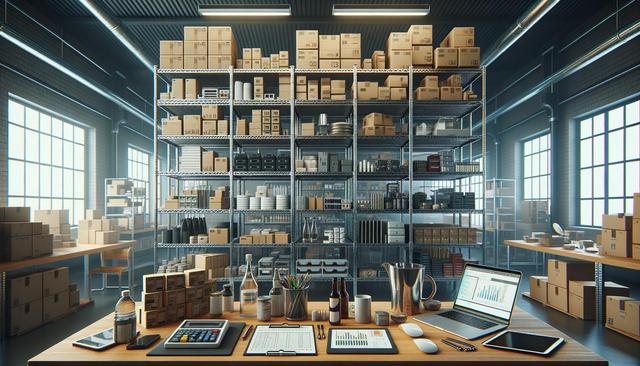Understanding the Role of Industrial Shelving in Small Businesses
For small businesses in Kenya, making the most of limited space is often a challenge. Industrial shelving plays a crucial role in optimizing available room by offering structured, vertical storage solutions. These shelving units are not just about stacking boxes—they are about creating a more efficient workflow, reducing clutter, and ensuring that products, tools, or documents are easily accessible. Whether in a compact retail store, a busy office, or a growing warehouse, industrial shelving helps small businesses streamline operations and remain organized as they expand.
One of the key benefits of industrial shelving is its adaptability. It can be customized to suit the specific needs of a business, whether that means accommodating bulk inventory or organizing office supplies. This flexibility is particularly important as companies scale and their storage requirements evolve. Choosing the right type of shelving can contribute significantly to workplace safety and productivity, ensuring that everything has its place and can be retrieved without hassle.
Types of Industrial Shelving Suitable for Kenyan Enterprises
There are several shelving types available, each offering its own set of advantages depending on the application. Choosing the appropriate system depends on the nature of the items being stored, the available floor space, and the frequency of access. Some common industrial shelving types include:
- Rivet shelving: Known for its strength and tool-free assembly, ideal for heavy or bulky items.
- Wire shelving: Offers good ventilation and is often used in environments where cleanliness is critical.
- Steel shelving: Durable and long-lasting, often found in warehouses or garages.
- Mobile shelving: Mounted on tracks, perfect for offices or archives with limited space.
Each of these systems can be integrated into a business’s existing layout with minimal disruption. For example, mobile shelving can be a space-saving solution for document-heavy offices, while rivet shelving is excellent for backroom storage in retail outlets. Understanding the pros and cons of each type helps entrepreneurs make informed investment decisions.
Storage Efficiency and Workflow Optimization
Effective storage goes beyond neatness—it directly impacts workflow. In fast-paced business environments, time spent searching for items can accumulate into significant productivity losses. Industrial shelving addresses this by introducing structure and visibility to stored goods. Items are not only easier to store but also quicker to locate and retrieve, which can enhance customer service and employee efficiency.
Moreover, shelving systems can reduce the risk of workplace accidents. By keeping items off the floor and in designated spaces, small businesses minimize tripping hazards and create a safer working environment. Proper labeling and categorization on shelves further support quick decision-making and inventory control, especially during peak business seasons or stocktaking periods.
For firms that manage a wide range of products or materials, implementing a tiered shelving strategy can be beneficial. This involves:
- Placing fast-moving items at eye level for quick access
- Storing heavy items on lower levels to avoid lifting injuries
- Keeping rarely used items on higher or back shelves
Such practices enhance ergonomics and contribute to a more organized and efficient workspace.
Customizing Shelving for Industry-Specific Needs
Different industries have varying storage requirements, which is why customization is a key feature of industrial shelving systems. For example, a retail business in Nairobi may need display-friendly shelving that also serves as storage, while a small manufacturing firm in Mombasa might require heavy-duty shelves that can support machinery parts or tools. Office environments may prioritize accessibility and aesthetics, opting for shelving that complements existing furniture while keeping files and supplies within reach.
Many shelving providers in Kenya offer modular systems that can be adjusted in height and width, or expanded with additional units as the business grows. This scalability ensures that the shelving remains relevant as operational needs evolve. Additional accessories, such as bins, dividers, and label holders, can further enhance organization and usability.
When selecting shelving, small business owners should also consider material quality and environmental conditions. For instance, metal shelving with corrosion-resistant coatings may be necessary in coastal regions, while powder-coated systems may be better suited to dry, dusty environments. Tailoring shelving to industry-specific demands ensures long-term functionality and value.
Budget Considerations and Long-Term Value
While the initial cost of industrial shelving may seem like a significant expense for a small business, it’s important to view it as a long-term investment. High-quality shelving systems reduce future replacement and maintenance costs, and their durability supports years of service. Additionally, improved organization can lead to indirect savings by reducing lost inventory, minimizing damage, and increasing employee productivity.
Kenyan businesses can explore a variety of options within their budget range, from locally manufactured units to imported modular systems. It’s advisable to compare multiple suppliers, inquire about warranties, and consider installation services as part of the overall investment. Conducting a thorough needs assessment before purchase helps prevent over- or under-investment in shelving infrastructure.
For businesses just starting out, it may be more practical to begin with a smaller number of shelves and gradually add more as demand increases. This staged approach offers flexibility and ensures that capital can be allocated to other pressing needs. Regardless of the budget, prioritizing quality and suitability will deliver better returns over time.
Conclusion
Industrial shelving solutions offer small businesses in Kenya a practical and scalable way to manage their storage needs. By choosing systems that align with their industry and available space, entrepreneurs can improve workflow, enhance safety, and prepare for future growth. Investing in shelving is more than just organizing inventory—it’s about laying a strong foundation for operational efficiency and business success. With smart planning and the right shelving strategy, small firms can make the most of their resources and stay competitive in a growing market.




Leave a Reply